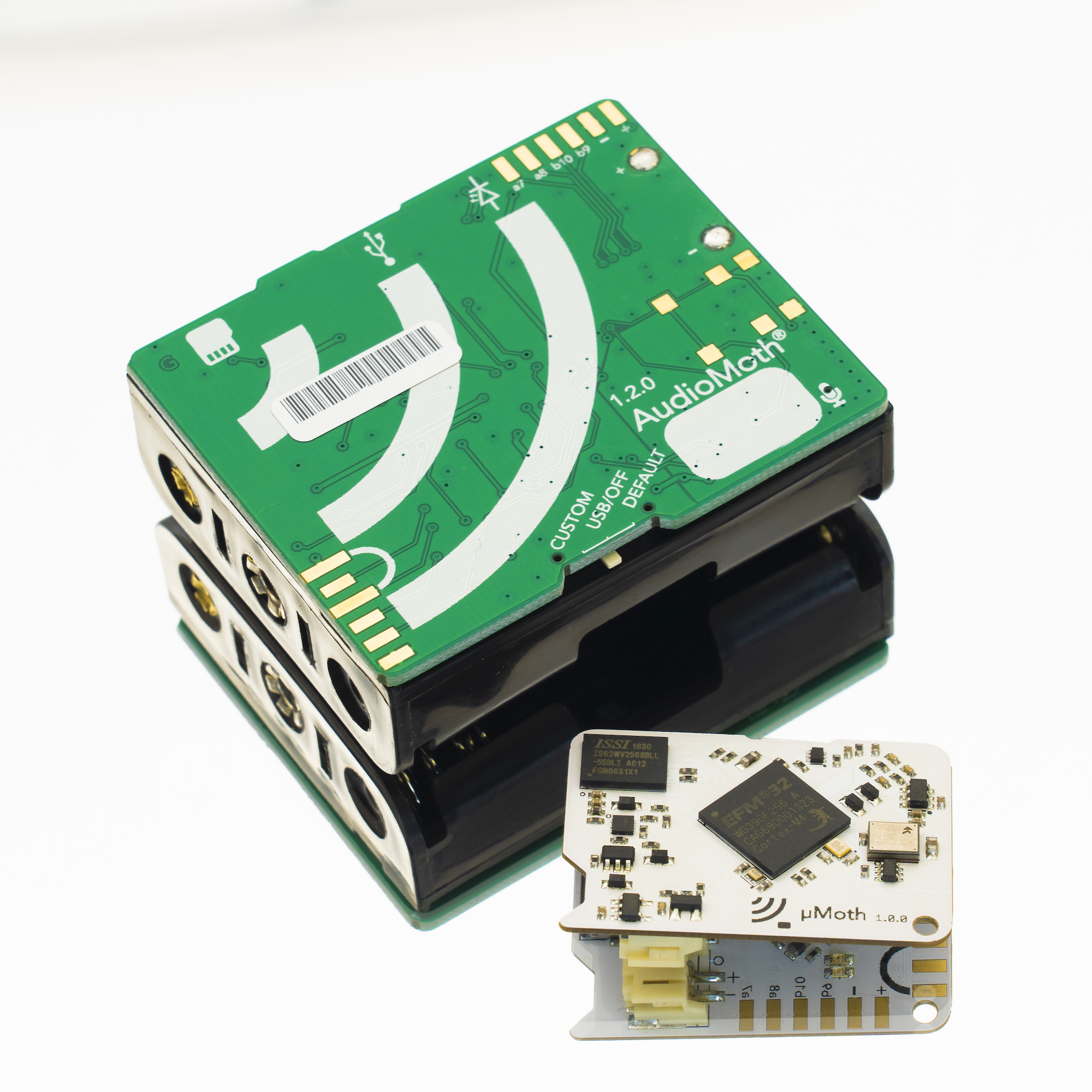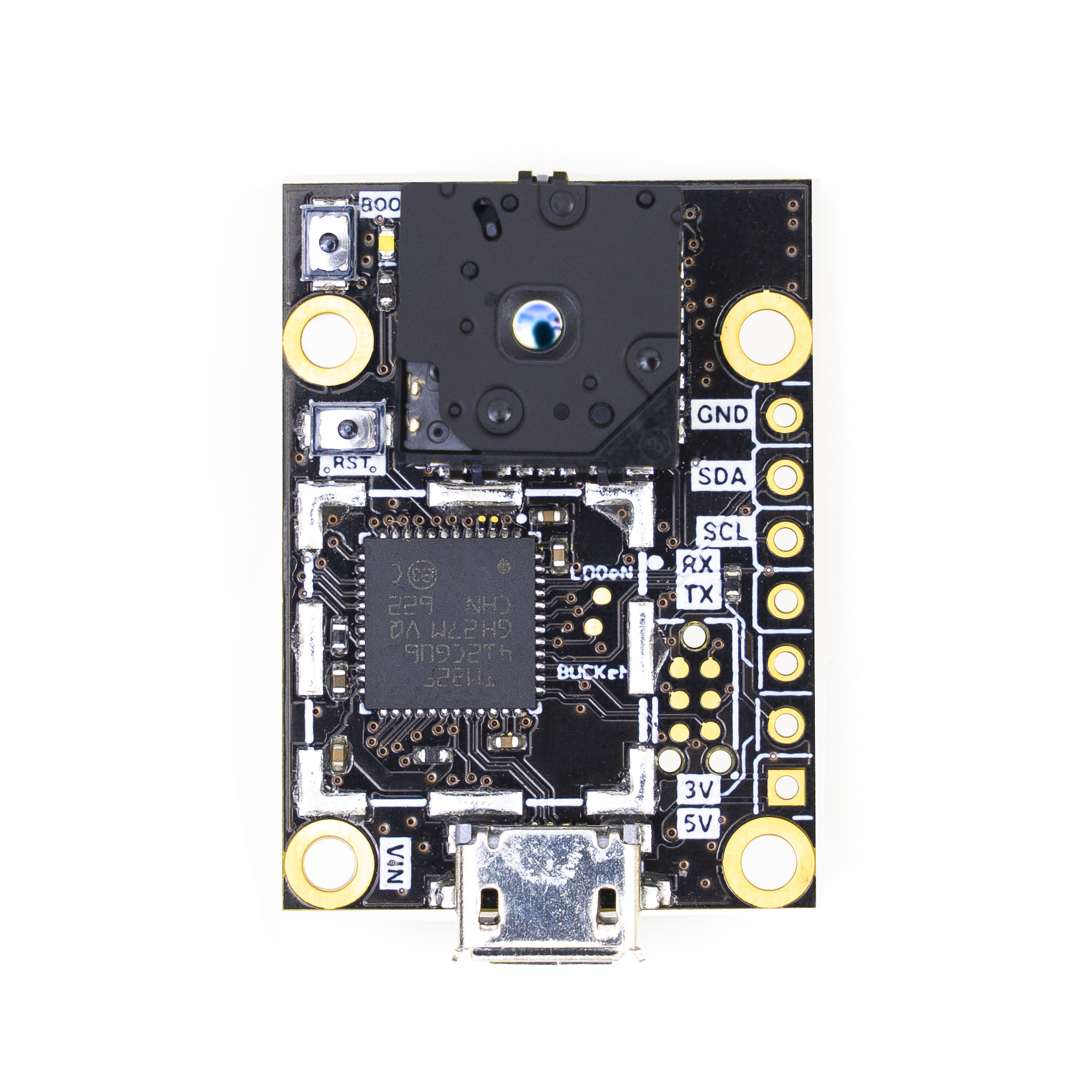GroupGets staff stand outside the company's offices in Midtown Reno. From left: Matthew Navarro, Griffin Covert, Edwin Molina, Nate Penrod and Ron Justin.
Photo by Kaleb Roedel.
Scattered in nature all over the world are some 30,000 devices that are recording thousands of hours of sound for conservation research.
Developed by UK-based Open Acoustic Devices, the AudioMoth “acoustic logger” sensors are in caves listening for ultrasonic bat calls, oceans recording as whales communicate, and jungles monitoring gunshots by illegal poachers.
And the funding, production and distribution of these credit card-sized sensors capturing environmental sounds around the globe are organized by a small startup company in the Biggest Little City in the World.
Reno-based GroupGets is an online group-buying platform “created by engineers for engineers,” said founder Ron Justin. In a nutshell, the platform enables developers to group-buy cutting-edge electronics with high minimum order quantities or crowd-fund production runs for vetted hardware.
The latter function of GroupGets’ platform was born in 2017, when a team of computer scientists from the University of Oxford and the University of Southampton — a group that later became Open Acoustic Devices — reached out to GroupGets and asked if they could use their platform to fund a production round of the acoustic recording device they were developing.
“They were the first group that wanted to use GroupGets to fund production,” Justin said. “GroupGets was mainly founded to buy parts on the shelf — some widget that’s 20% cheaper if you buy 100 versus buying one. That was the main use case.
“So we had no idea how big the partnership (with Open Acoustic Devices) was going to be.”
Turns out, it was huge. Four years later, GroupGets, which was established in 2014,
has hosted a total of 14 fundraising rounds for Open Acoustic Devices’ AudioMoth and manufactured more than 10,000 units, shipping them to every corner of the globe. GroupGets has the devices manufactured at Vital Systems Corp., in Reno, Justin noted. GroupGets’ platform enabled UK-based Open Acoustic Devices to fund the production of its AudioMoth and MicroMoth devices that are used in the wild for conservation research.
GroupGets’ platform enabled UK-based Open Acoustic Devices to fund the production of its AudioMoth and MicroMoth devices that are used in the wild for conservation research.
“There’s just this huge community behind it,” Justin said of the product. “We’ve shipped them literally everywhere because people are using them in forests and jungles for conservation research.
“We’re happy to be part of it,” he continued. “Let’s face it, climate change is here, we’re all being affected by it. So if we can be enabling more environmentally impactful projects like this, that would be something I would jump on.”
COVID-DRIVEN DEMAND
It’s a microcosm of the big impact the small startup is having in regions near and far-flung.GroupGets’ design team, GetLab, makes custom electronics, software and accessories to enhance products funded or sold on its crowd-purchasing platform.One of those products is a thermal webcam module for a long-wave infrared thermal imaging camera developed by FLIR Systems, one of GroupGets’ first partners. (And biggest. Earlier this year, Teledyne Technologies acquired FLIR for $8.2 billion.)
In 2020, when the coronavirus pandemic swept across the world and temperature checks became a part of everyday life, GroupGets saw a “massive uptick” in orders for its thermal webcam module, Justin said — specifically, a surge of orders came from a German manufacturer that was using the module and selling its thermal camera systems to airports all over Europe.
He added that the module is also used for diagnostics in the healthcare industry, another sector that has significantly increased its thermal imaging use amid the pandemic. One of the products GroupGets’ design team, GetLab, makes for FLIR Systems, a thermal imaging camera and sensor developer, is a smart thermal webcam module called PureThermal 2.
One of the products GroupGets’ design team, GetLab, makes for FLIR Systems, a thermal imaging camera and sensor developer, is a smart thermal webcam module called PureThermal 2.
In fact, GroupGets’ revenue more than doubled in 2020 when compared to 2019. All the while, the Reno startup doubled its staff size from five to 10 employees.
This year, however, GroupGets is one of many companies in the electronic hardware space to “hit a speed bump” due to sweeping chip shortage, Justin said. Simply put, their production capabilities have slowed to a crawl for devices like the AudioMoth, among others.
“We cannot get critical parts that we need,” he said. “We try to be nimble and we always buy more than we need. That’s gotten us this far, but we’ve finally hit the end of the road.”
FUNDING FACTS
This all begs the question, how exactly does the GroupGets funding model work?
A company can start a campaign on the platform to raise production funds for an electronic widget, setting either a target quantity or time-length for the round. The cost to launch a campaign? Free.
If, and only if, the campaign is successfully funded, GroupGets will bill the backers of the round. It then handles the collection of funds and sends the money to the campaign creator. GroupGets’ standard cut is 20%, which includes fulfillment. If a company has GroupGets take care of manufacturing and fulfillment, their cut doubles to 40%, Justin said.
Justin said there are typically six to eight campaigns happening at any given time on their group-buying platform.
The Reno-based startup also has an ecommerce store where it sells products that do repeatedly well over multiple rounds, like the AudioMoth, Justin said.
“It helps us with our campaign creators, because we show, hey, we’re willing to put some skin in the game,” Justin said. “And that keeps my store more interesting because I don’t want to sell the same electronics as a major distributor. We’re extremely boutique in our store and strategic about what we sell. And that model has been very, very good to us. We got the data to back up what’s going to sell.”
 GroupGets’ platform enabled UK-based Open Acoustic Devices to fund the production of its AudioMoth and MicroMoth devices that are used in the wild for conservation research.
GroupGets’ platform enabled UK-based Open Acoustic Devices to fund the production of its AudioMoth and MicroMoth devices that are used in the wild for conservation research. One of the products GroupGets’ design team, GetLab, makes for FLIR Systems, a thermal imaging camera and sensor developer, is a smart thermal webcam module called PureThermal 2.
One of the products GroupGets’ design team, GetLab, makes for FLIR Systems, a thermal imaging camera and sensor developer, is a smart thermal webcam module called PureThermal 2.